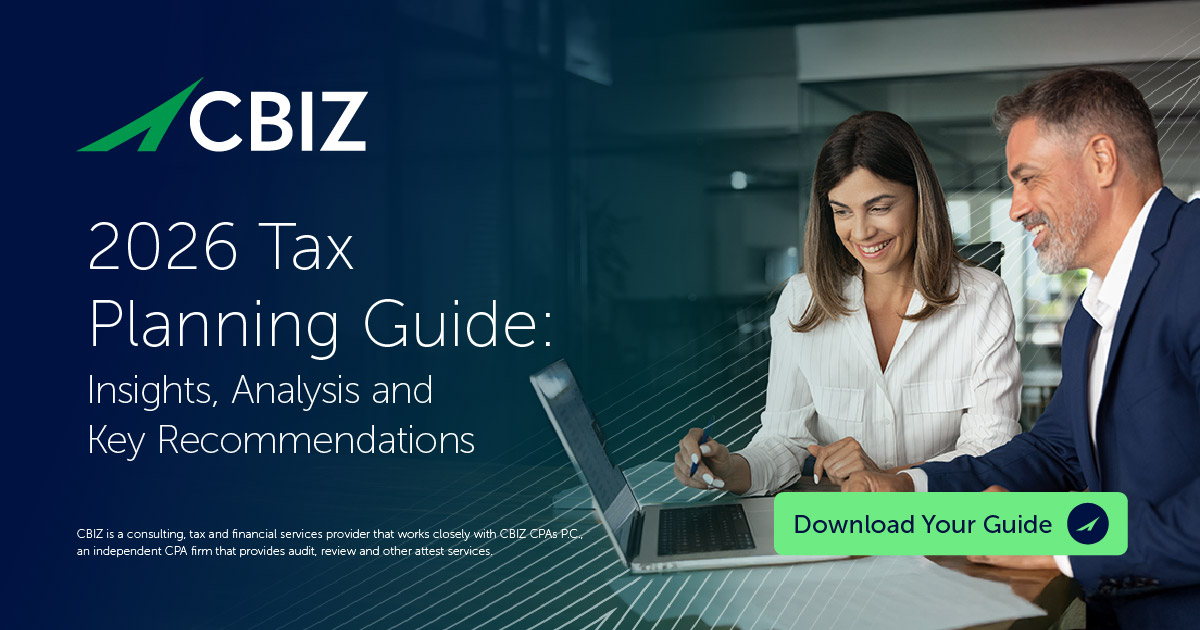The One Big Beautiful Bill Act (OBBBA) features new advantageous provisions that encourage business leaders in the construction industry to reassess their tax strategies.
Here are some areas of focus to align your tax strategy with new opportunities.
Contracts
Contractors can report revenue from construction contracts under several methods of accounting, each of which can produce different results. When a construction contract is long-term in nature (spanning two or more tax years), contractors are required to use the percentage-of-completion method (POCM) for accounting income tax reporting purposes. While this is a requirement, exemptions exist for home construction contracts, or if the taxpayer meets the small contractor exception.
Review work in process (WIP) schedules for open and closed jobs to identify contracts that lend themselves to deferral opportunities. The intended use of the project, the type of work being performed, and the percentage completed at year-end are important factors. Understanding the WIP, your contract language, and having a thorough knowledge of IRC 460 Special Rules for Long-Term Contracts will enable you to identify tax deferral opportunities.
POCM Exemptions Expanded Under OBBBA
Expanded Home Construction Contract Exception
Under previous law, a home construction contract was any contract associated with a project in which 80% or more of the estimated total contract costs are reasonably expected to be attributable to the building, construction, reconstruction, or rehabilitation of dwelling units in buildings with four or fewer units.
The OBBBA expands the home construction exception to apply to residential construction contracts, which now include apartment buildings, condominium complexes, student housing, long-term care facilities, and other properties with no limit on the number of residential units. This change is effective for contracts entered into in tax years beginning on or after the date of enactment of the OBBBA (i.e., for contracts entered into after 2025 for calendar year taxpayers).
Note that the home construction contract rules are only applicable to home construction contracts. Contractors who are also engaged in commercial, governmental or other types of construction contracts may still need to calculate their construction-related income with respect to those contracts under POCM, unless they meet the small contractor exception discussed below.
Small Contractor Exception
In addition to the exception for home construction contracts above, “small contractors” are also not required to use POCM for purposes of calculating their taxable income. The following two requirements must be met for the small contractor exception to apply:
- At the time the contract was entered into, it was estimated that it would be completed within two years from the commencement date, and
- The contractor’s average annual gross receipts for the three taxable years preceding the year in which the contract was entered do not exceed $31 million (this $31 million amount is adjusted for inflation annually).
If either of the provisions above are met (home construction or the small contractor exception), contractors may use income reporting tax methods other than IRC section 460’s POCM accounting to calculate their taxable income, including:
- Cash Basis
- Accrual Method
- Accrual Less Retainage
- Completed Contract Method (CCM)
In addition to the expanded home construction exemption, additional deferral options may be available to large contractors under IRC section 460’s POCM rules, including:
- 10% elective deferral
- Excluding retainage receivable and payable
- Allocating general and administrative expenses in accordance with IRC section 460
Current tax accounting methods should be reviewed to determine whether requesting a change in method may be advantageous. To request a change in method of accounting for contracts, Form 3115 is generally required to be filed with the Internal Revenue Service with the taxpayer’s timely-filed return (including extensions) for the year of change.
If you have any questions about the expanded home construction contract rules, the small contractor exception, or other accounting method questions related to the construction industry, please contact a CBIZ construction industry expert.
© Copyright CBIZ, Inc. All rights reserved. Use of the material contained herein without the express written consent of the firms is prohibited by law. This publication is distributed with the understanding that CBIZ is not rendering legal, accounting or other professional advice. The reader is advised to contact a tax professional prior to taking any action based upon this information. CBIZ assumes no liability whatsoever in connection with the use of this information and assumes no obligation to inform the reader of any changes in tax laws or other factors that could affect the information contained herein. Material contained in this publication is informational and promotional in nature and not intended to be specific financial, tax or consulting advice. Readers are advised to seek professional consultation regarding circumstances affecting their organization.
“CBIZ” is the brand name under which CBIZ CPAs P.C. and CBIZ, Inc. and its subsidiaries, including CBIZ Advisors, LLC, provide professional services. CBIZ CPAs P.C. and CBIZ, Inc. (and its subsidiaries) practice as an alternative practice structure in accordance with the AICPA Code of Professional Conduct and applicable law, regulations, and professional standards. CBIZ CPAs P.C. is a licensed independent CPA firm that provides attest services to its clients. CBIZ, Inc. and its subsidiary entities provide tax, advisory, and consulting services to their clients. CBIZ, Inc. and its subsidiary entities are not licensed CPA firms and, therefore, cannot provide attest services.
















